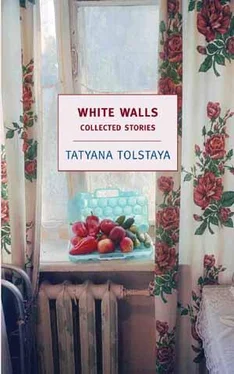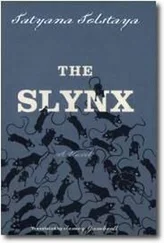There. Get the results of the blood test; one last humiliation—and upward! To the stars! Serafim knew the results beforehand: no traces of filth, nothing lowly, denigrating, or shameful would be detected. Not like these others.
Serafim got on the bus. People pressed in. Careful there, those are wings!
“You should take taxis,” said a woman. But she looked at Serafim’s luminous face—and smiled. Get away, you base thing!
He made his way to the middle. Someone touched one wing with a finger. Stung, he turned around. A small boy, hideous-looking—glasses, crossed eyes, no front teeth—was looking at Serafim’s luxurious, swanlike feathering. His whole body winced: the snotty freak… with dirty hands!
Yes and here’s the result of the blood test: aqua distillata [sic!]. What did you think it would be?… Swine!
The day was ending. The sweaty din, sticky dirt, stench, the human swarm—everything was loaded onto wagons and carted away. The deep blue evening, brandishing a broom, nodded to Serafim as it advanced from the east. A gentle silvery sheen set in on high. On the emptying streets each black silhouette was i ndividually underlined. Piggish faces dared to smile at Serafim, to look into his face. Annihilate them all, thought Serafim. Incinerate every one of them. Yes, my face shines. Not for you! How dare you look!
By the time he approached his building, it was completely dark. A temptingly empty bench. I’ll have a breath of fresh air. And tomorrow—the flight.
He spread his wings, looked upward. The starry wheel turns slowly, slowly. Berenice’s Hair, Virgo, the Herdsman, the Hunting Dogs—clean, cold, April diamonds. That was the place for Serafim. A sexless, shining body, he would glide in silvery raiment through the resonant heights, let the streaming cold of the constellations run between his fingers, dive into ethereal currents. Dling! Dling!—the starry threads jingled like the strings of a harp. He would drink his fill of the clean, sparkling bubbles of the twenty-star Cup—And burn up the filthy earth. He’d pluck out the double, transfusing star from the Hunting Dogs constellation—the Heart of Charles… And he’d scorch the earth with fire.
Behind the bench, in the thick, bare bushes, something rustled, crackled, yapped—the white dog ran out, spun around, waved its tail, jumped on Serafim’s lap—joyfully, joyfully, as if it had found a long-lost friend. It jumped about noisily, trying to lick his face.
Serafim fell from the sky, jerked away, screamed, thrust out his arms. The dog jumped back, sat on its hind legs, tilted its head, and looked straight at Serafim endearingly. The sight of the affectionate muzzle and dark dog eyes caused something hot and dirty to rise in Serafim’s chest, fill his throat. Silently, gritting his teeth, trembling, hating, Serafim moved toward the dog. It didn’t understand and was overjoyed, wagged its tail, grinned, and ran to meet him. Serafim kicked at the dog’s eyes with his heel, lost his footing, kicked, kicked, kicked! There we go.
He stood for a while. The dog lay stretched out. Quiet. The stars dripped. A woman’s voice called:
“Sha-arik, Sharik, Sharik!… Sha-aaaarinka, Sharinka, Sha-rinka!…”
The same for you, thought Serafim. Stamp out everyone. Trying not to make any noise with his wings, he quickly moved toward the building.
He slept badly that night. His jawbones ached. He awoke at dawn, and felt his alarmingly changed palate with his tongue. Something was wrong. He yawned—and had difficulty opening his mouth. Everything had somehow become different. Something’s in the way. It had gotten colder. He wiped his face with his hand and looked—blood: he’d cut his palm on the end of his nose. The mirror! From the white morning murk, from the oval frame, someone was looking out at Serafim: a red, horny beak; a low forehead covered with blue-gray scales; from the mouth, the edges of a narrow slit, two large, long milk-white fangs. Serafim looked coldly into the frame. He ran the split tongue along the fangs. They’re strong. He looked at the clock: Off to the dentist. The private doctor. There’s time before the flight.
Tap tap tap went his claws on the asphalt. Faster—tap, tap tap tap tap…
“The monster Serpent Gorynych!” shouted some boys. “Look there’s Serpent Gorynych!”
Serafim tucked his coat tight around him, grabbed his wide black wings, and took off at a run—the bus had already rounded the corner.
Translated by Jamey Gambrell
SHE WAS born some fifty years ago. They called her Natasha. The name promised large gray eyes, soft lips, a delicate silhouette, perky hair with highlights. But what came out was a fat, porous face, an eggplant nose, a dejected chest, and short, bulging bicycle calves.
In childhood she was whisked from under the gloomy arches of gray Liteiny Prospect to a dacha outside Leningrad: where exactly—had been forgotten. The name had faded, crumbled, scattered to the winds like a dry leaf; sometimes at night it thrashed against the glass, its shadow rustled—a long, long, Finnish word stretched out in the middle.
The name was lost, the days were long gone, her curly-headed little girlfriends had melted along the way—in dreams only the whisper of their feet could be heard, only the dim, distant laughter, transparent like a drawing on the air.
On lonely nights memories of gigantic trees, roads of boundless breadth, and cupolas soaring into ceiling heights came to Natasha in dreamy gusts, like a shadow sliding by. Everything had slipped away, disappeared into thin air, vanished without a trace. Long ago in that now disintegrated world, they played the most delightful games on green lawns, and an ominous significance haunted the dark, immutable incantations that resounded like alarm bells:
The moon came out behind a cloud,
He drew a knife and cried out loud:
Now I’ll stab you,
Now I’ll hit,
I don’t care, ’cause you are IT!
And the horrid, yellow, horned moon with a human face rose up from the clouds of blue-black billowing fog, and its armor clanked dimly and its word—was law. I don’t care, ’cause you are it! And they were afraid of the Moon and did not violate its oppressive, threatening will. Except when one of them cried out the colorful, catchy, lizardlike word: chooreekee! allyallyin-comefree! Then for a second the horrific wheel of the world stopped running, stood rooted to the spot, the iron gates locked open, the fetters unfastened—and inside the charmed, delicate rainbow bubble of sudden freedom the little rebel himself stiffened in surprise, stopped in shock.
Heavenly valleys, tall rose-colored grasses swaying in the warm breeze; hills rising with floral breath. And in the evenings, a never-extinguished sunset beyond the black spruce peaks—orange, raspberry; in the evenings—gray, red-eyed wolves carefully distributed between the tree trunks, waiting in vain for their sinister wolfish opportunity—but no one would lie near the edge of the bed or cradle.
And in the heights above everything stretched the world of grownups—noisy, droning high overhead like pines in foul weather. Grownups: large, warm pillars, reliable, eternal columns that held out glasses of milk and offered trays of latticed blueberry pie, that ran out with prickly wool sweaters in their outstretched hands and got down on their knees to fasten small dusty sandals.
And then something broke, something went wrong. The kaleidoscope—and everything in it—shattered: a handful of dull glass shards, bits of cardboard, and strips of fiery, crimson-backed mirror. The world began to dwindle and wither, the grass receded, the ceiling lowered, borders started to show through, the delightful games were forgotten. The evening fog, the wolves and the forest, it turned out, were painted on canvas carelessly tacked on wood stretchers that leaned against the cold wall. Grownups broke all the rules and died: Father was crossed out by the red line of war, Mother shriveled and extinguished; their faces dissolved in a tremulous netting of rain. The only one to dig in, hold on, the only one to stay—was Grandmother. And like a barrier, like Baba Yaga’s pike fence, impenetrable, pitch-black adolescence rose up in front of Natasha: twisted dead-ends, shameful thoughts, revolting conjectures.
Читать дальше












